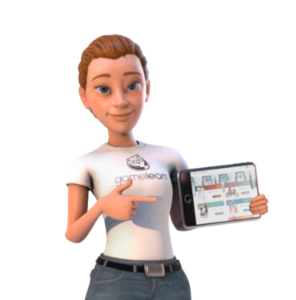Customers
- Large Enterprises (>10,000)
- Public Administrations
- Small/Medium Businesses
Use Cases
- Compliance Training
- Employee Onboarding
- Employee Training
- Franchise/Dealer Training
- Workforce Development
Industries
- Automotive
- Banking
- Government: Military/Aerospace/Defense
- Insurance
- Pharmaceuticals
Deployment
- Software as a Service / Cloud
Browsers
- Apple Safari
- Google Chrome
- Internet Explorer
- Mozilla Firefox
Training
- Documentation
- Live Online
- Online Tutorials
- Webinars
Support
- Business Hours
- Email
- FAQ
- Knowledge Base
- Live Online
- Online Community
- Phone
What is Gamelearn LMS & Campus?
Gamelearn Campus
When students log on to the Campus, they’re presented with a user-friendly interface that allows them to access all the video games necessary to complete their predetermined itinerary. You can decide which games will be made available to them by adjusting the user settings in the LMS.
Gamelearn LMS
Create classes, manage students, track student progress, and review all of your team’s relevant KPIs. Our LMS allows you to manage your courses, classes, and students in a stress-free way.
Student & Class Management
Manage your classes and students from the LMS control panel. You can create as many classes as you like and group your students by classes. This will give them access to one or more courses. This configuration allows you to control the itineraries or training programs that you offer to your students. There is also the possibility of opening up the entire catalog to them.
Read more
Read less
Overview of Gamelearn LMS & Campus benefits
1 – Practical and quality content
Students and workers are weary of the theories and philosophies that pervade most e-learning courses. And this is why Gamelearn has opted for carefully crafted, well thought-out courses, where priority is given to quality and useful lessons that employees can apply to their day-to-day work. Our online courses are full of techniques, recommendations and tips on very specific and practical subjects. As a result, up to 97% of students who have completed our courses believe that what they learned can be applied to real life.
2 – Engagement through gamification
The use of game mechanisms (a story, rewards, badges, competing with other players, etc.) means that students have fun, become engrossed in the video game and complete the course. While the completion rate for traditional e-learning courses is between 25% and 30%, that of Gamelearn is around 94%. It’s very simple: when we have fun, we learn more and better.
3 – Game-based learning, simulation and experiential learning
Gamelearn’s third (and most important) pillar is the use of simulators and game-based learning. The key lies in the use of simulators to get students to practice the skills they learn and receive feedback on what they are doing. Just as you can learn to pilot a plane or drive a car using simulators, these can also be used to recreate human interactions and practice skills such as negotiation, time management, leadership and customer care.
Read more
Read less
Features
Learn more about Gamelearn LMS & Campus features that set it apart from the competition. Discover how its unique tools and capabilities enhance your processes.
Pricing
Learn more about Gamelearn LMS & Campus's pricing options, cost, and plans so you can make a well-informed, business-wise decision on the best software to use for organization.
Compare
Learn more about the top Gamelearn LMS & Campus competitors and alternatives. Read the latest reviews, pricing details, and features and and find the best software.




